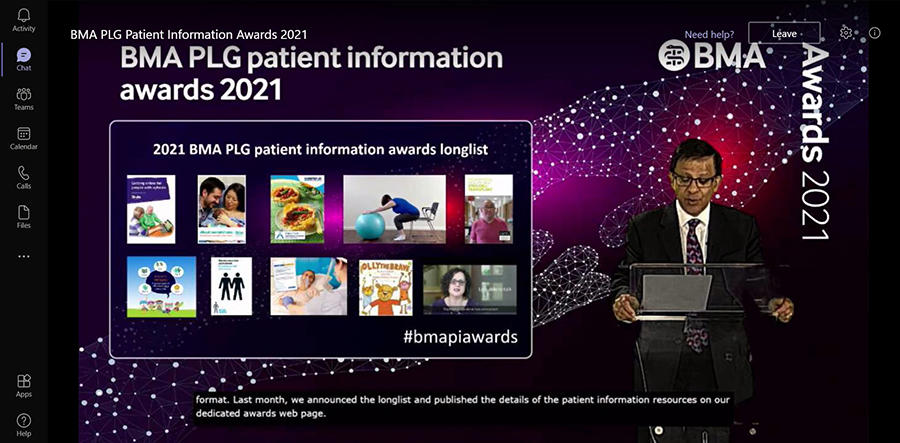Patient information is fundamental to effective, patient-centred, quality care. It rightly considers patients as partners in their care, empowering them to self-manage their conditions as appropriate, have a better understanding of their health or illness, and to make informed choices and decisions regarding their treatment.
Furthermore, evidence shows that less than half of what is told to patients during a consultation is remembered afterwards. Hence patient information given during a doctor-patient interaction, which can be consumed outside of a consultation, is more likely to result in patients following medical advice. High-quality patient information is of benefit not only to patients themselves, but also to doctors by enabling efficient use of their time and improving health outcomes.
The BMA is playing a part in driving this agenda, which has never been more crucial in the current environment facing patients and doctors as we continue to face down COVID-19 and tackle the massive backlog of non-COVID care.
 The online patient information awards ceremony
The online patient information awards ceremony
This week I was proud that the BMA hosted our annual PLG (patient liaison group) patient information awards. These awards were first established in 1997 to encourage the production of accessible and well-designed patient information, and this year we received over 260 resources submitted on a range of topics. The event was held virtually, but broadcast from an audience-free Great Hall using the marvels of technology to give it a sense of occasion.
It was an honour for me to chair this worthy event, and to interview our chair of the patient liaison group, Chrissie Douglass. Chrissie explained the invaluable work of the group, which informs the BMA of the patient’s perspective in our work and policy making.
It was so inspiring to see so many excellent examples of patient resources in the shortlist. Over the past 14 months of the pandemic, we have seen so much innovation in creating the digital resources needed to widen access and overcome the constraints on face-to-face contact between patients and health professionals because of the pandemic.
The five-strong shortlist showed a depth of empathy for patients and their loved ones, a sense of inclusivity in how they target specific groups, and creativity in the outputs and resources.
We saw everything from a series of story books for children suffering from terminal conditions, a web resource for families to guide them through end-of-life care during the pandemic, and the winning entry from Prostate Cancer UK which provided materials to gay and bisexual men. This was notable for how it responded to research showing this group has different experiences of prostate cancer to others.
At the ceremony there was also an opportunity to celebrate another successful campaign launched in late 2020 by charity Medical Aid – whose trustees include BMA council member Jeeves Wijesuriya. They have released a series of animated videos for communities across the UK on medical rights, protection and self-care strategies during the pandemic. This work underpins the need for health systems and practitioners to offer cultural competence to address disparities in patient outcomes for all communities. Cultural competence is the ability to provide care to patients with diverse values, beliefs and behaviours, including the tailoring of healthcare delivery to meet patients’ social, cultural and linguistic needs.

Clear, concise, accurate and compelling information is clearly vital as part of our ongoing battle with the pandemic. Last week the BMA launched a social media campaign aimed at improving uptake of the COVID vaccine. We released a series of videos on Instagram with the core message being Spread the word, not the virus. This is a simple call to action which encourages the target audience, who will be largely within the 20-40 age bracket, to spread information and a positive message to family and friends about the benefits of being vaccinated.
Patient information is a fundamental part of our working lives as doctors and is integral to the doctor-patient relationship. As doctors, having fingertip keyboard access to patient resources that allows us to efficiently provide them to the patients we care for would be transformative for both patients and doctors.
As we rightly consider lessons from the immensely challenging last 14 months, we should also address how we empower and arm professionals and the public with the information they need and deserve for better health outcomes.

